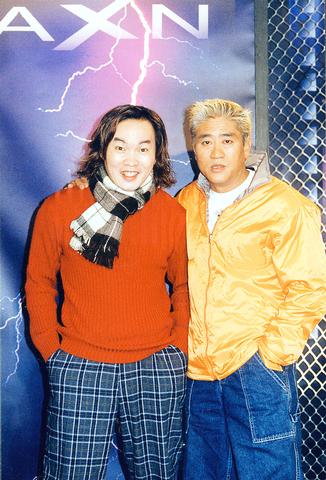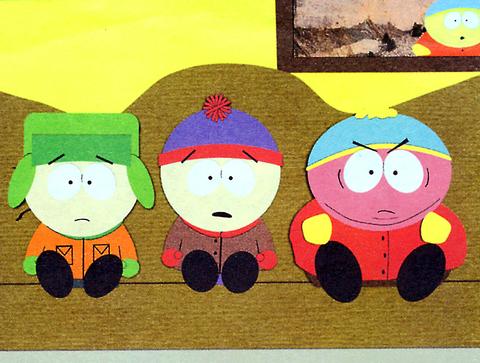The foulmouthed brats of South Park don't look especially Taiwanese as they scurry across animated snow-covered landscapes, so it may seem odd to viewers familiar with the English version of the show when they open their mouths and crack jokes about Lee Teng-hui (李登輝) in a mixture of Mandarin and Taiwanese.
On other shows, Taiwanese emcees replace the original Western hosts and the formats of popular Western game shows are copied wholesale, but with the substitution of Taiwanese hosts and competitors.
Often through reformatting, rewriting entire scripts or by adding a local celebrity to be a program host, some of the country's non-Mandarin-language cable TV stations are adapting their programming by localizing their content in the hope of expanding their audience and boosting ratings.

PHOTO COURTESY OF AXN
Looking to stand out
Leading the charge to diversify their content and include more recognizably local elements are AXN, Star TV, Disney Channel and Power TV, all of which have realized that their brand recognition as foreign-language channels no longer constitute a distinct advantage in attracting viewers.
"With the number of television channels in Taiwan now, it's becoming increasingly difficult to stand out if you don't include some localized broadcasts," explained Cindy Liu (

PHOTO COURTESY OF STAR TV
"People presume you're just another channel that airs foreign programs. If you want to be recognized as more than another foreign-language station, then you have to include programs with local content and make more shows relevant to Taiwan. What has viewers transfixed in North America, for example, isn't necessarily going to interest anyone in Taiwan."
Early last week the latest evidence of the localization of Taiwanese TV was beamed into homes in the form of a local take on the hugely popular Survivor series which revolutionized so-called reality TV in the US, England and Australia. In the Power TV show, contestants were forced to live in a plexiglass box without food for five days.
The challenge may not have been as death-defying as those on Western versions of reality TV shows, but this didn't deter masses of viewers from tuning in to gawk at nine starving people stuck in a clear plastic box.

PHOTO COURTESY OF AXN
Lost in translation
Not all localization drives, however, are as successful as Power TV's. Many viewers are put off by what often ends up as awkward translations and stilted humor.
Billy Huang (黃炳雲), vice president of the Disney Channel Taiwan, is painfully aware of the difficulties in adapting shows to local audiences.

PHOTO COURTESY OF DISNEY
"Not all programs travel well. I remember we were running the Golden Girls series a few years ago and there was a joke about the smell of cheese in one episode. Well, we didn't think that the smell of cheese was relevant in Taiwan, so we replaced cheese with stinky tofu when we wrote the subtitles," recalled Huang. As a result, the station was inundated by calls from outraged viewers who felt the planting of stinky tofu on a purely American TV show was unacceptably fake. They wanted the show translated verbatim.
In a recent viewer survey, Disney Taiwan discovered that the popularity of localization depended on the type of program. According to Huang, television audiences in Taiwan don't mind the dubbing and slight alterations of scripts on cartoons, but draw the line at movies.
"We've found that viewers don't want to see a cowboy or a New York cop speaking in Mandarin," Huang said. "Who would? It just looks stupid."
The ultimate translation riddle for stations, however, has been transferring the dialogue of foreign comedy shows or cartoons into comprehensible and humorous Mandarin.
When MTV first began to air the infamous cartoon duo Beavis and Butthead with Chinese subtitles in 1997 the company found that direct translations of profanity and jokes weren't funny in Mandarin in part because they were more offensive than the terms' meanings in English. So the channel watered down the translations of profanity and the show became a smash hit.
More recently, Star TV ran into the same problems when it began to air its dubbed version of South Park. Direct translation of the cartoon proved impossible. Station programmers opted instead to rewrite the entire script. Jokes with references to issues, people and places familiar to audiences in the US were replaced with subject matter more relevant to Taiwan.
Two of the most popular episodes of Taiwan's South Park were aired during Taiwan's 2000 presidential campaign. The computer-animated kids poked fun at all three presidential candidates and at Lee Teng-hui for his controversial interpretation of cross-strait relations as state-to-state in nature in the summer of 1999. For all the potential missteps, South Park has managed to emerge as one of the most popular TV shows on Taiwanese TV.
Localization of television isn't always just a matter of deftly translating and rewriting scripts. Often entire programs are re-edited and re-formatted to include a local celebrity host, whose job it is to bring some local flavor to the programming.
After an abortive attempt at re-creating an extreme sports show from the US, AXN's programmers came up with a far more successful localization project with a show titled The World's Most Amazing Videos (飛越生死線). The show, purchased from NBC of the US, features home videos of disasters, silly accidents, daring feats and embarrassing situations. With the simple addition of a Taiwanese host -- in this case stuntman Ko Hsiou-liang (柯受良) -- the show proved so popular that although it originally aired for one run in April, 2000, the station still broadcasts re-runs each week.
"The show was really popular. We purchased the original show and simply added film of Ko in place of the show's original host," Liu said. "We did try to make localized additions with locally recorded videos, but after about a month we'd used up all the videos we received. I don't think people in Taiwan like the thought of being seen on television making fools of themselves or getting hurt. I think it's a question of face."
Making it on their own
With the ratings war heating up between so many channels on Taiwan's cable TV market, stations are having to dig deeper into their wallets to successfully localize their content, and have begun producing their own shows.
Disney is looking to build on the success of it's imported kids show, Disney Mailbox (迪士尼信箱), which began airing five years ago and is hosted by the charismatic Arthur Chang (張洛君) and Vega Tsai (蔡燦得). The three-minute show has had a huge response from viewers, leading the station to begin producing a three-hour version of the show that will run Mondays to Fridays.
Aiming for a slightly more mature audience, AXN is looking to capitalize on a remake of the 1970s TV show Charlie's Angels.
Set to air in September, Asian Charlie's Angels (幻影天使) is not only the station's most ambitious project to date, but is also the most costly project aimed at localizing a successful overseas program by a local cable TV station.
Covering all its broadcast bases, AXN chose three angels -- Wu Chen-chun (吳辰君) from Taiwan, Lin Hsi-lei (林熙蕾) from Hong Kong and Qu Ying (瞿穎) from China. In a further bid at geographical parity, the action series even boasts a production crew from Hong Kong and Taiwan and was filmed on location in China.
"The show is one of a kind. No other company in Taiwan has ever attempted anything like this before. Instead of just aiming the program at audiences in Taiwan we have come up with a program that can be aired as a localized show in Hong Kong, China and Taiwan," explained AXN marketing manager Edith Liang (梁家珍).
If the show proves as successful as AXN hopes, then we could begin to see other channels splashing out on big-budget, localized productions and before too long Taiwan may get its own Six Million New Taiwan Dollar Man.

June 23 to June 29 After capturing the walled city of Hsinchu on June 22, 1895, the Japanese hoped to quickly push south and seize control of Taiwan’s entire west coast — but their advance was stalled for more than a month. Not only did local Hakka fighters continue to cause them headaches, resistance forces even attempted to retake the city three times. “We had planned to occupy Anping (Tainan) and Takao (Kaohsiung) as soon as possible, but ever since we took Hsinchu, nearby bandits proclaiming to be ‘righteous people’ (義民) have been destroying train tracks and electrical cables, and gathering in villages

Dr. Y. Tony Yang, Associate Dean of Health Policy and Population Science at George Washington University, argued last week in a piece for the Taipei Times about former president Ma Ying-jeou (馬英九) leading a student delegation to the People’s Republic of China (PRC) that, “The real question is not whether Ma’s visit helps or hurts Taiwan — it is why Taiwan lacks a sophisticated, multi-track approach to one of the most complex geopolitical relationships in the world” (“Ma’s Visit, DPP’s Blind Spot,” June 18, page 8). Yang contends that the Democratic Progressive Party (DPP) has a blind spot: “By treating any

Swooping low over the banks of a Nile River tributary, an aid flight run by retired American military officers released a stream of food-stuffed sacks over a town emptied by fighting in South Sudan, a country wracked by conflict. Last week’s air drop was the latest in a controversial development — private contracting firms led by former US intelligence officers and military veterans delivering aid to some of the world’s deadliest conflict zones, in operations organized with governments that are combatants in the conflicts. The moves are roiling the global aid community, which warns of a more militarized, politicized and profit-seeking trend

This year will go down in the history books. Taiwan faces enormous turmoil and uncertainty in the coming months. Which political parties are in a good position to handle big changes? All of the main parties are beset with challenges. Taking stock, this column examined the Taiwan People’s Party (TPP) (“Huang Kuo-chang’s choking the life out of the TPP,” May 28, page 12), the Democratic Progressive Party (DPP) (“Challenges amid choppy waters for the DPP,” June 14, page 12) and the Chinese Nationalist Party (KMT) (“KMT struggles to seize opportunities as ‘interesting times’ loom,” June 20, page 11). Times like these can